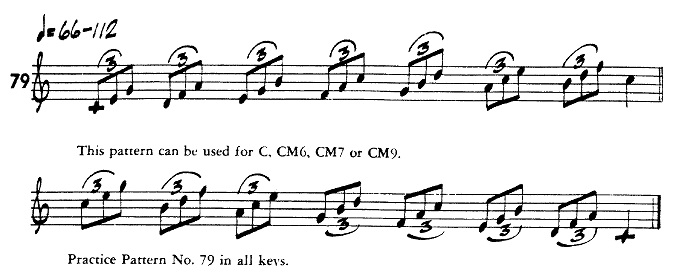a new way to learn scales (and a bunch of other stuff in the process)
-
Hi All, My name is Dr.Mark and like everyone here I've spent hours with scales, scales, and more scales.
Here's something I hope you find a little more fun (always play forwards and backwards). Before there were scales as we know them, there were modes which are still very much used. Here's a way to learn the scale and the 7 modes for that scale. As most know, C major to C major is the Ionian mode. D to D in the key of C is the Dorian. Try this. Play a little something in the C major scale starting on C. You'll notice it sounds happy. Next, Stay in the key of C but start on D and play a little something from D to D in the key of C. Chances are it will sound sad or minor. That's the sound of the Dorian mode.
Now for the fun part! Play these 7 triads starting on middle C and learn the sound of ALL the modes at the same time. Remember you're in the key of C so start on C and play the triads slowly up the staff.
(C-E-G) Ionian (D-F-A) Dorian (E-G-B) Phrygian (F-A-C)Lydian (G-B-D)Mixolydian (A-C-E)Aolian (B-D-F)Locrian
Be sure to play all the triads going up then down. They can be slurred, tongued, played backwards etc. The idea is that you will have a better association with the scale and have the sound of the different modes in your ears. This fits every major scale. Hope this helps those struggling with scales and modes.
Dr.Mark -
"A new way?" Where's rowuk.
-
Hi Kehaulani,
That made me laugh so hard, tears ran down my leg.
Dr.Mark -
Then I'll play in Dorian the next time.
-
@Dr-Mark said in a new way to learn scales (and a bunch of other stuff in the process):
As most know, C major to C major is the Ionian mode. D to D in the key of C is the Dorian... Chances are it will sound sad or minor. That's the sound of the Dorian mode.Dr.Mark
Dr. Mark,
It is my understanding the Mr. Dorian is under treatment for depression which goes to my next correlation:How many psychologists does it take to change a light bulb?
One, but the bulb has to want to be changed. -
@Dr-Mark said in a new way to learn scales (and a bunch of other stuff in the process):
Now for the fun part! Play these 7 triads starting on middle C and learn the sound of ALL the modes at the same time. Remember you're in the key of C so start on C and play the triads slowly up the staff.
(C-E-G) Ionian (D-F-A) Dorian (E-G-B) Phrygian (F-A-C)Lydian (G-B-D)Mixolydian (A-C-E)Aolian (B-D-F)Locrian
Be sure to play all the triads going up then down.
Dr.MarkYou know, I have been looking trough the "want ads" in the American Federation of Musician's trade journal. I notice that more and more job applications are requiring the applicant to be able to play all the scales in all the modes for their visit.
-
@Kehaulani said in a new way to learn scales (and a bunch of other stuff in the process):
"A new way?" Where's rowuk.
Rowuk has been in the wings (probably something wished for by many at TrumpetMaster back in the day), just watching where this stuff goes. As we can clearly see, history repeats itself.
Scales, modes and triads are a great way to build patterns - although not new, most of us will admit that we do not practice them enough. Certainly worthy of a post in pedagogy.
-
I would add that, once you have associated the modes with the scale degrees of a particular scale (C Ionian, D Dorian, E Phrygian etc.) you need to run all mode forms using the same root, i.e. C Ionian, C Dorian, C Phrygian and so forth.
-
@ROWUK said in a new way to learn scales (and a bunch of other stuff in the process):
Scales, modes and triads are a great way to build patterns - although not new, most of us will admit that we do not practice them enough. Certainly worthy of a post in pedagogy.
I wish someone would write all these patterns down.


Jerry Coker's Patterns For Jazz, pattern #79. The book contains many patterns that anyone (not just jazz musicians) can use to learn their way around their instrument.
Mike
